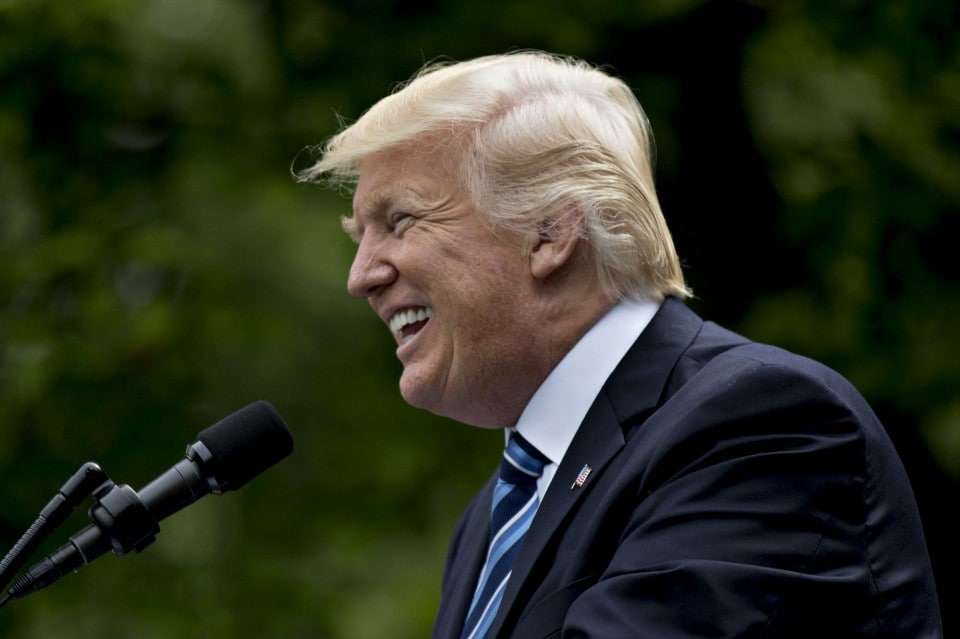The King's English

Sometimes, commentary is hardly necessary - the words speak for themselves. Verbum ipsa loquitur. Here, unedited - posted, appallingly enough, at the official White House website - are the remarks by the leader of the free world on the occasion of the House's passage of the the Trumpcare bill:
And I will say this, that as far as I'm concerned, your premiums, they're going to start to come down. We're going to get this passed through the Senate. I feel so confident. Your deductibles, when it comes to deductibles, they were so ridiculous that nobody got to use their current plan - this nonexistent plan that I heard so many wonderful things about over the last three or four days. After that, I mean, it's - I don't think you're going to hear so much. Right now, the insurance companies are fleeing. It's been a catastrophe. And this is a great plan. I actually think it will get even better. And this is, make no mistake, this is a repeal and replace of Obamacare. Make no mistake about it. Make no mistake. (Applause.)
And I think, most importantly, yes, premiums will be coming down. Yes, deductibles will be coming down. But very importantly, it's a great plan. And ultimately, that's what it's all about.
We knew that wasn't going to work. I predicted it a long time ago. I said, it's failing. And now, it's obvious that it's failing. It's dead. It's essentially dead. If we don't pay lots of ransom money over to the insurance companies it would die immediately.
So what we have is something very, very incredibly well-crafted. Tell you what, there is a lot of talent standing behind me. An unbelievable amount of talent, that I can tell you. I mean it. (Applause.) And coming from a different world and only being a politician for a short period of time - how am I doing? Am I doing okay? I'm President. Hey, I'm President. Can you believe it? Right? (Applause.) I don't know, it's - I thought you needed a little bit more time. They always told me, more time. But we didn't.
But we have an amazing group of people standing behind me. They worked so hard and they worked so long. And when I said, let's do this, let's go out, just short little shots for each one of us and let's say how good this plan is - we don't have to talk about this unbelievable victory - wasn't it unbelievable? So we don't have to say it again. But it's going to be an unbelievable victory, actually, when we get it through the Senate.
And there's so much spirit there. But I said, let's go out - we have a little list of some of the people - and I think after that list goes, if they don't talk too long, our first list, we're going to let some of the other folks just come up and say whatever you want.
But we want to brag about the plan, because this plan really - uh oh. (Laughter.) Well, we may. (Laughter.) But we're just going to talk a little bit about the plan, how good it is, some of the great features.
[He then continued for a bit, though he never did get to talking about all of those "great features." Italics added.]
I'm sorry, but I cannot get used to the fact that our president cannot speak in coherent sentences. It is inexcusable - unacceptable in a 14-year-old. "Premiums will come down, and deductibles will come down"; good deal! Is there anyone - anyone - who thinks that President Trump understands health-care markets, and the impacts of this bill on those markets, remotely well enough to say that? Does anybody care anymore about little things like that? I guess that when you have a president whose campaign officials are under FBI investigation on the basis of evidence that they may have collaborated with a foreign power to disrupt the U.S. presidential election, all this is just a small blip on the radar. But it appalls just the same.
It is clear that the decline of a language must ultimately have political and economic causes: it is not due simply to the bad influence of this or that individual writer. But an effect can become a cause, reinforcing the original cause and producing the same effect in an intensified form, and so on indefinitely. A man may take to drink because he feels himself to be a failure, and then fail all the more completely because he drinks.
It is rather the same thing that is happening to the English language. It becomes ugly and inaccurate because our thoughts are foolish, and the slovenliness of our language then makes it easier for us to have foolish thoughts.
George Orwell, Politics and the English Language (1946).
"The point," Orwell continued, "is that the process is reversible." I hope he was correct.
